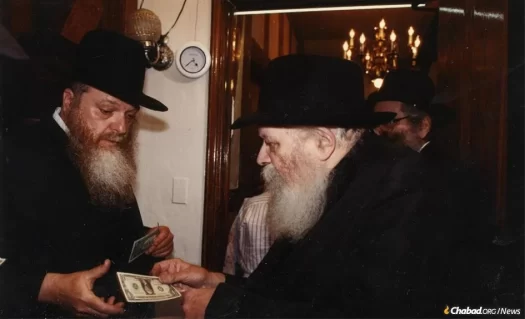
Obituary: Rabbi Yosef Rosenfeld, 89, Made Immigrant School a Global Powerhouse
by Mendel Super – chabad.org
For more than six decades Rabbi Yosef (Joseph) Rosenfeld served as the steward of Oholei Torah Educational Institution in Brooklyn, N.Y., one of the largest yeshivahs in the world. His formal title was executive director, but the term would not accurately describe his total devotion to the institution and, more importantly, its staff and students.
“The buck stopped with Yossel,” says the school’s director of development, Rabbi Nosson Blumes, using an affectionate Yiddish diminutive for Yosef. “There was nothing that fell through the cracks, because he picked everything up: From meeting the payroll to compassionately dealing with a child experiencing a rough patch, he did everything and anything needed to support the yeshivah and its students and help them grow.”
Rabbi Rosenfeld passed away on Sept. 15 (19 Elul). He was 89.
When Rabbi Rosenfeld first became principal of the fledgling yeshivah back in 1960, the school numbered 100 children. Over the decades, he guided its growth to 2,000 students, ranging from preschool through Talmudical seminary, where post-high school yeshivah students graduate with a First Talmudic Degree, accredited by the Association of Advanced Rabbinical and Talmudic Schools (AARTS).
Located in Brooklyn’s Crown Heights neighborhood, Oholei Torah is the largest yeshivah affiliated with the Chabad-Lubavitch movement and among its tens of thousands of alumni are Chabad emissaries from Angola to Prague to Ukraine. Rabbi Gabi Holtzberg, the director of Chabad of Mumbai who was murdered by terrorists together with his wife, Rivky, and four guests, likewise studied at Oholei Torah. But its graduates are not limited to Jewish communal leaders: they include real estate developers, mortgage brokers, accountants, lawyers and doctors—all of them steeped in Oholei Torah’s deeply Chassidic education and its vision for global transformation.
That each individual has the responsibility and power to change the world for the better was the central idea Oholei Torah was founded to transmit, and no one believed in it more than Rabbi Rosenfeld.
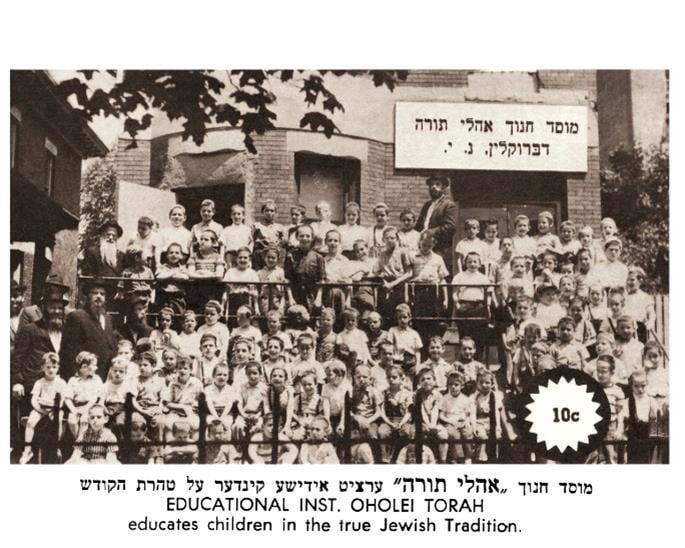
A Lifelong Dedication to G‑d, Torah and Mitzvahs
Yosef Chaim HaKohen Rosenfeld was born in the Brownsville section of Brooklyn in 1933. His parents, Reb Chanoch Henoch and Esther Miriam, were Gerrer Chassidim, followers of the prominent Polish Chassidic dynasty. Chanoch Henoch was a shochet, a kosher slaughterer, whose reputation preceded him. When the Sixth Rebbe, Rabbi Yosef Yitzchak Schneersohn, of righteous memory, visited New York in 1929, the Rebbe inquired about the shochet who slaughtered the meat he was served. When they told him it was Chanoch Henoch Rosenfeld, he expressed his satisfaction.
Young Yossel Rosenfeld was neighbors with the Groner family, growing up at the same time as the late Rabbi Yitzchak Dovid Groner, later the emissary of the Rebbe—Rabbi Menachem M. Schneerson, of righteous memory—in Australia, and his younger brother, Rabbi Yehudah Leib Groner, who would later become a member of the Rebbe’s secretariat. Chanoch Henoch observed his neighbor’s refined, G‑d fearing children and asked their father, Rabbi Mordechai Groner, where he sent them to school. “Lubavitch,” the latter responded. Chanoch Henoch immediately wanted to transfer his boys to the Lubavitch yeshivah, re-established on American shores only two years earlier, in 1940.
The one problem was young Yossel’s asthma condition, and for that reason his father felt Yossel needed to continue studying closer to their Brownsville home. In an audience with the Sixth Rebbe, the Rebbe laughed and said not to worry. “My father describes how when the [Sixth] Rebbe laughed, his whole body shook,” says Sholom Rosenfeld. The Rebbe’s words had the desired effect, and Yossel Rosenfeld’s asthma disappeared altogether.
Rosenfeld would gain a reputation as a Torah scholar and a meticulously G‑d fearing Jew with a particular dedication to others.
“My father would go out fundraising for the yeshiva every night, together with [Oholei Torah’s founding director] Rabbi Michoel Teitelbaum,” recalls his son, Rabbi Sholom Rosenfeld, who worked alongside his father for the three decades and is Oholei Torah’s administrator. “No matter how late it was when he got home, he sat down and studied Torah for two hours. Then, when he finished learning, he’d put on his hat and jacket and recite the bedtime shema for a long time.”
Rosenfeld’s personal dedication to G‑d, Torah study, and the meticulous performance of mitzvahs, especially the mitzvah of helping others, were attributes he would strive to instill in the tens of thousands of students who’d walk through Oholei Torah’s doors over the decades.
Dispatched to Israel Following Terror Attack
With the passing of the Sixth Rebbe in 1950, Rosenfeld became a devoted student of his son-in-law and successor, the Rebbe. In 1956—the same year Oholei Torah was founded—a group of Arab terrorists entered a vocational school in the Chassidic village of Kfar Chabad, Israel, and murdered five students and a teacher in cold blood. In response the Rebbe sent a hand-picked delegation of 12 senior yeshiva students including Rosenfeld to visit, comfort and strengthen the village’s broken residents and Israel at large.
“The Rebbe told us that really he should have gone himself to Eretz Yisrael, but that since he couldn’t go, he was sending us as his shluchim (emissaries) in his stead,” Rosenfeld later recalled. “The Rebbe told us where to go and exactly whom to visit. We stopped in England, Belgium, Paris and Italy. Then we went to Eretz Yisrael. We were gone for a total of six weeks.”
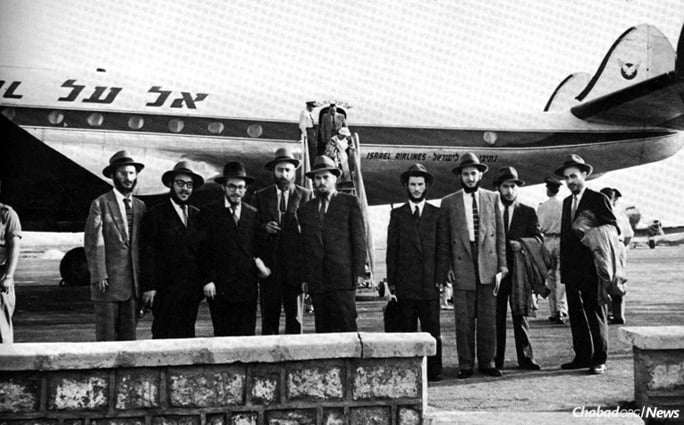
Two years later, just days after his marriage to Malka Lokshin, at which the Rebbe officiated, the Rebbe chose Rosenfeld and his new bride for another mission. This time, it was to strengthen the Jewish community in San Francisco. Chabad’s roots in the northern California city stretch back at least to the 1908 founding of Congregation Zemach Zedek, and the Rosenfelds remained in San Francisco for two years, forging connections with people and impacted many lives.
One relationship was particularly close to home. The rabbi of Congregation Bnai David in San Francisco was an elderly Lubavitcher Chassid named Rabbi Zalman Bezpaloff, the scion of a famed Chassidic family. Bezpaloff’s wife was also a distant relative of the Rebbe’s. Bezpaloff’s prized possession was a cane that had belonged to the Sixth Rebbe. As he and Rosenfeld grew closer, the elderly man decided to gift the cane to Rosenfeld.
“My father immediately boarded a flight to New York and presented the cane to the Rebbe,” recalls Sholom Rosenfeld. The Rebbe wished to pay him, and Rosenfeld refused. But the Rebbe insisted, quoting Proverbs: “ … he who hates gifts will live.”
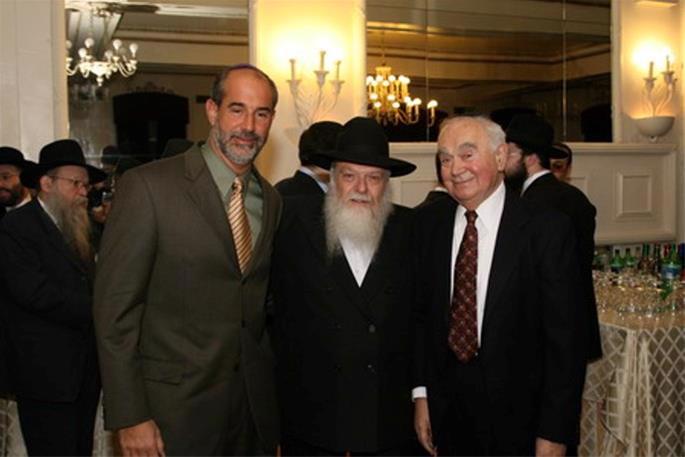
Educating a New Generation of Chabad Chassidim
Upon their return from San Francisco, the Rosenfelds had a private audience with the Rebbe, who informed them their future work mission would be in New York. Soon after Oholei Torah’s principal was sent as a Chabad emissary to Italy and Teitelbaum, the school’s founder, brought Rosenfeld on board as the new principal. It was in this role, and later, as executive director, that Rosenfeld oversaw the birth of a new generation of Chassidim—American-born, but steadfastly committed to Torah and Chassidic ideals.
In response to the school’s massive growth Rosenfeld spearheaded the purchase of the famed Brooklyn Jewish Center, the very first “shul with a pool” that had been one of America’s preeminent Jewish institutions in its heyday. The massive rise in crime in American cities during the turbulent 1960s destroyed many urban Jewish communities, and the Jews of Crown Heights were likewise pressured to abandon the neighborhood. It was then that most members of the once-thriving Jewish center decamped for other, safer neighborhoods. Meanwhile, after the Rebbe announced he’d under no circumstances abandon Crown Heights and with it those too old, infirm or impoverished to move, the Lubavitchers chose to stay.
Wishing to preserve the Jewish character and legacy of their building, the Brooklyn Jewish Center’s board leased the massive granite building to Oholei Torah in 1972. A decade later, in 1982, the board agreed to sell the building to the yeshivah, and at a tenth of the price it was being offered by other groups. From its central Eastern Parkway location, the school grew to encompass almost an entire block, becoming one of New York’s largest Jewish educational centers. Rosenfeld and the school’s board remained in close contact with members of the Brooklyn Jewish Center, hosting many reunions over the years where they could see what their community center had become.
A School Rooted in the Grit and Tenacity of Its Founders
Like the refugees of Soviet anti-Jewish persecution who founded it, Oholei Torah’s beginnings were humble.
“We studied in [founder] R’ Michoel’s synagogue and his wife was my first teacher,” remembers Rabbi Zalman Levertov, one of the school’s first students and since 1977 director of Chabad-Lubavitch of Arizona.
Nevertheless, Oholei Torah was rooted in the grit and tenacity its founders had displayed for the sake of Jewish education under the eyes of the Soviet secret police.
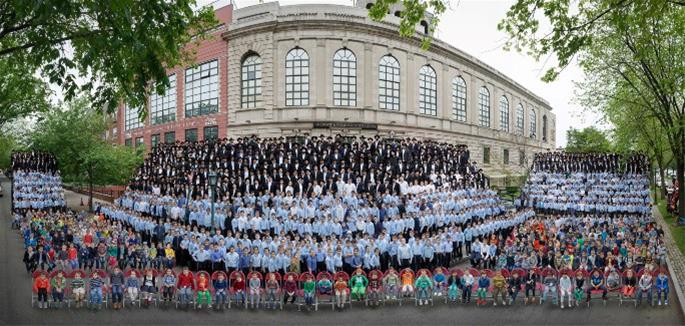
“Our parents were mostly Chassidim from Soviet Russia,” Levertov explains. “They had mesiras nefesh (self-sacrifice) for their Jewish education. The kids left home before 13, some never saw their parents again. They received a Torah education in the underground yeshivahs, far from the state-run schools the Soviets wanted to indoctrinate them in. We, their children, were privileged to attend Oholei Torah and continue in the path of our parents and grandparents.”
It was the Brooklyn-born Rosenfeld who was able to take the Soviet Chassidic legacy of self-sacrifice Oholei Torah had been built on and combine it with the American entrepreneurial spirit to transform it into what it is today.
Joseph Popack, a longtime supporter of Oholei Torah, knew Rosenfeld for almost his entire life. “He was a close friend of my father, Reb Shmuel Isaac Popack,” he says. “He came to my father when he needed help and I got to know him too. He was a real person, always caring for everyone, always besimchah (joyful) and optimistic.”
Popack, a New York-based philanthropist, has been intimately involved with the yeshivah’s operations and growth for decades. “We can see what the yeshivah is all about by what it has produced: These boys have become pillars of Chabad, the Jewish people and the world at large.”
Whether it was raising funds from donors or blessing the students of the yeshiva with the Kohen’s priestly blessing, as he was wont to do, it was all for the goal of Jewish education, the absolute highest value in Rosenfeld’s life. Says Popack: “He used to tell me he’s happy doing what he did because it’s a purpose that cannot be matched by anything else.”
He is survived by his children: Rabbi Menachem Mendel Rosenfeld (Montreal, Canada); Rivkah Grossbaum (Stony Brook, N.Y.); Rabbi Yitzchok Rosenfeld (Toronto, Canada); Shterny Fogelman (Los Angeles, Calif.); Rabbi Yisroel Rosenfeld (Melbourne, Australia); Rabbi Sholom Rosenfeld (Brooklyn, N.Y.); Chana Konikov (Roslyn, N.Y.); Nechama Dina Katz (Brooklyn, N.Y.); and many grandchildren and great-grandchildren.
He was predeceased by his wife, Malka Rosenfeld, earlier this year.
This article has been reposted with permission from chabad.org












